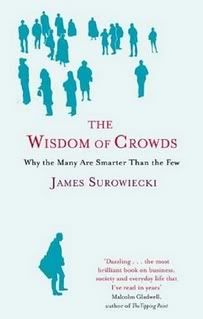
This book has been a fascinating look at collective intelligence, the idea that we make better decisions as a group than we do as individuals. The book begins with simple illustrations, such as these:
Consider one of those festival games where you must guess how many jelly beans are in a jar. Alone, you will likely be far off. But, when averaging together hundreds of guesses, the result was likely closer to accurate than any single guess.
A scientist kept track of a competition at a county fair in 1906. The challenge was to guess the weight of an ox. Many farmers and ranchers (people with extensive knowledge of oxen) were in attendance and gave their best guesses. The scientist simply averaged all of the guesses (the collective guess, you could say) and was off by less than a pound.
More complex stories are offered, such as the American military idea of Commander’s Intent. That is the policy that subordinates are generally free to do what they please (i.e. avoid micro-management) as long as they fulfill the main objective, the Commander’s Intent. The underlying idea is that while the Commander may be the most knowledgeable and the most qualified to offer orders on how things must be done, it is the field generals that have the most intimate knowledge base (and therefore the most comprehensive knowledge base) and should be trusted to carry out the mission in the way they see fit.
As always, I fail to do proper justice to the book. But, maybe you get the idea.
Wisdom of Crowds on Wikipedia
No comments:
Post a Comment